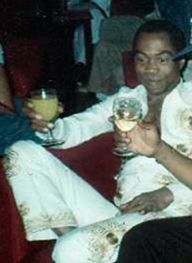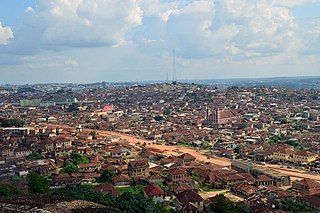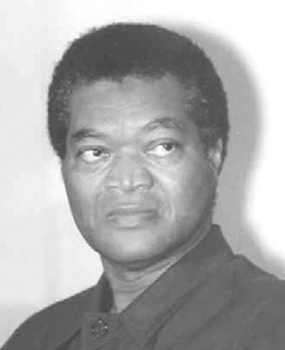| |||||
| Decades: | |||||
|---|---|---|---|---|---|
| See also: | |||||
The following is a list of events in 1977 in Nigeria .
| |||||
| Decades: | |||||
|---|---|---|---|---|---|
| See also: | |||||
The following is a list of events in 1977 in Nigeria .

Fela Aníkúlápó Kútì was a Nigerian musician and political activist. He is regarded as the principal innovator of Afrobeat, a Nigerian music genre that combines West African music with American funk and jazz. At the height of his popularity, he was referred to as one of Africa's most "challenging and charismatic music performers". AllMusic described him as "a musical and sociopolitical voice" of international significance.

Chief Olusegun Matthew Okikiola Ogunboye Aremu Obasanjo is a Nigerian general and statesman who served as Nigeria's head of state from 1976 to 1979 and later as its president from 1999 to 2007. Ideologically a Nigerian nationalist, he was a member of the Peoples Democratic Party (PDP) from 1998 to 2015, and since 2018.

Chimamanda Ngozi Adichie is a Nigerian novelist, short-story writer and activist. Regarded as a central figure in postcolonial feminist literature, she is the author of the novels Purple Hibiscus (2003), Half of a Yellow Sun (2006) and Americanah (2013). Her other works include the book of essays We Should All Be Feminists (2014); Dear Ijeawele, or A Feminist Manifesto in Fifteen Suggestions (2017); a memoir, Notes on Grief (2021); and a children's book, Mama's Sleeping Scarf (2023).
Kalakuta Republic was the name musician and political activist Fela Kuti gave to the communal compound that housed his family, band members, and recording studio. Located at 14 Agege Motor Road, Idi-Oro, Mushin, Lagos, Nigeria, it had a free health clinic, and recording facility. Fela declared it independent from the state ruled by the military junta after he returned from the United States in 1970. The compound burned to the ground on February 18, 1977 after an assault by a thousand armed soldiers.
Dr. Bekolari Ransome-Kuti was a Nigerian physician known for his work as a human rights activist.

The Independent National Electoral Commission (INEC) is the electoral body which oversees elections in Nigeria. It was established in 1998 shortly before Nigeria's transition from military to civilian rule.

The National Theatre, Nigeria is the primary centre for the performing arts in Nigeria. It shares the same architectural design as the Palace of Culture and Sports in Varna, Bulgaria, and it is four times bigger. The monument is located in Iganmu, Surulere, Lagos. Its construction was completed in 1976 in preparation for the Festival of Arts and Culture (FESTAC) in 1977.
Kachifo Limited is an independent publishing house based in Lagos, Nigeria. It was founded in 2004 by Muhtar Bakare. Its imprints include Farafina Books, Farafina Educational, and Prestige Books. From 2004 to 2009, it published the influential Farafina Magazine.
Half of a Yellow Sun is a novel by Nigerian writer Chimamanda Ngozi Adichie. It was published in 2006 by 4th Estate. The novel, set in Nigeria, tells the story of the Biafran War through the perspective of the characters Olanna, Ugwu, and Richard.

Abeokuta is the capital city of Ogun State in southwest Nigeria. It is situated on the east bank of the Ogun River, near a group of rocky outcrops in a wooded savanna; 77 kilometres (48 mi) north of Lagos by railway, or 130 kilometres (81 mi) by water. As of 2006, Abeokuta and the surrounding area had a population of 449,088.
Dodan Barracks is a military barrack located in Ikoyi, Lagos, Nigeria. The barrack was the Supreme Military Headquarters during the Nigerian Civil War and from 1966 to 1979 and 1983 to 1985, Dodan Barracks was the official residence of the military heads of state of the Nigerian military juntas of 1966–79 and 1983–99, and also the Supreme Military Headquarters from 1966 until the move to Abuja in 1991.

Olikoye Ransome-Kuti was a paediatrician, activist and health minister of Nigeria.

The Thing Around Your Neck is a short-story collection by Nigerian author Chimamanda Ngozi Adichie, first published in April 2009 by Fourth Estate in the UK and by Knopf in the US. It received many positive reviews, including: "She makes storytelling seem as easy as birdsong" ; "Stunning. Like all fine storytellers, she leaves us wanting more".

Americanah is a 2013 novel by the Nigerian author Chimamanda Ngozi Adichie, for which Adichie won the 2013 U.S. National Book Critics Circle Award for fiction. Americanah tells the story of a young Nigerian woman, Ifemelu, who immigrates to the United States to attend university. The novel traces Ifemelu's life in both countries, threaded by her love story with high school classmate Obinze. It was Adichie's third novel, published on May 14, 2013, by Alfred A. Knopf.

Festac '77, also known as the Second World Black and African Festival of Arts and Culture was a major international festival held in Lagos, Nigeria, from 15 January 1977 to 12 February 1977. The month-long event celebrated African culture and showcased African music, fine art, literature, drama, dance and religion to the world. Around 16,000 participants, representing 56 African nations and countries of the African Diaspora, performed at the event. Artists who performed at the festival included Stevie Wonder from United States, Gilberto Gil from Brazil, Bembeya Jazz National from Guinea, Mighty Sparrow from Trinidad and Tobago, Les Ballets Africains, South African artist Miriam Makeba, and Franco Luambo Makiadi. At the time it was held, it was the largest pan-African gathering to ever take place. The event attracted around 500,000 spectators.

Felabration is an annual music festival conceived in 1998 by Yeni Anikulapo-Kuti in memory and celebration of her father Fela Kuti, a Nigerian musician and human rights activist known for pioneering the Afrobeat genre of music. The one-week-long event which is held annually at the New Afrika Shrine in Ikeja, attracts visitors from different countries and has thus been considered as an official tourist destination by the Lagos State Government.

Jagua Nana is a 1961 novel by Nigerian novelist Cyprian Ekwensi. The novel was later republished in 1975 as part of the influential Heinemann African Writers Series.

Victor Ehikhamenor is a Nigerian visual artist, writer, and photographer known for his expansive works that engage with multinational cultural heritage and postcolonial socioeconomics of contemporary black lives. In 2017, he was selected to represent Nigeria at the Venice Biennale, the first time Nigeria would be represented in the event. His work has been described as representing "a symbol of resistance" to colonialism.

Dear Ijeawele, or A Feminist Manifesto in Fifteen Suggestions is an epistolary form manifesto written by Nigerian author Chimamanda Ngozi Adichie. Dear Ijeawele was posted on her official Facebook page on October 12, 2016, was subsequently adapted into a book, and published in print on March 7, 2017.